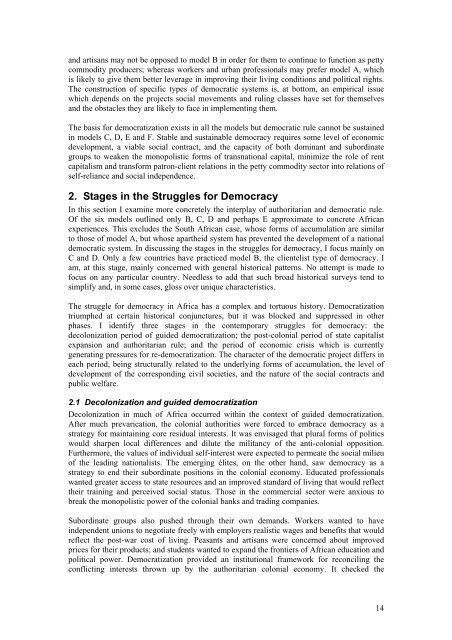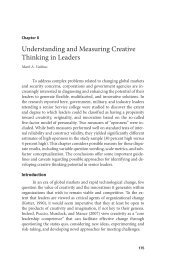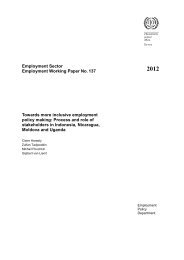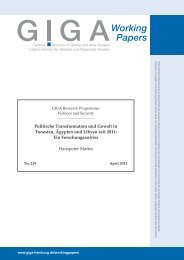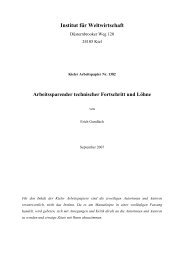Authoritarian Rule and Democracy in Africa: A Theoretical Discourse
Authoritarian Rule and Democracy in Africa: A Theoretical Discourse
Authoritarian Rule and Democracy in Africa: A Theoretical Discourse
You also want an ePaper? Increase the reach of your titles
YUMPU automatically turns print PDFs into web optimized ePapers that Google loves.
<strong>and</strong> artisans may not be opposed to model B <strong>in</strong> order for them to cont<strong>in</strong>ue to function as pettycommodity producers; whereas workers <strong>and</strong> urban professionals may prefer model A, whichis likely to give them better leverage <strong>in</strong> improv<strong>in</strong>g their liv<strong>in</strong>g conditions <strong>and</strong> political rights.The construction of specific types of democratic systems is, at bottom, an empirical issuewhich depends on the projects social movements <strong>and</strong> rul<strong>in</strong>g classes have set for themselves<strong>and</strong> the obstacles they are likely to face <strong>in</strong> implement<strong>in</strong>g them.The basis for democratization exists <strong>in</strong> all the models but democratic rule cannot be susta<strong>in</strong>ed<strong>in</strong> models C, D, E <strong>and</strong> F. Stable <strong>and</strong> susta<strong>in</strong>able democracy requires some level of economicdevelopment, a viable social contract, <strong>and</strong> the capacity of both dom<strong>in</strong>ant <strong>and</strong> subord<strong>in</strong>ategroups to weaken the monopolistic forms of transnational capital, m<strong>in</strong>imize the role of rentcapitalism <strong>and</strong> transform patron-client relations <strong>in</strong> the petty commodity sector <strong>in</strong>to relations ofself-reliance <strong>and</strong> social <strong>in</strong>dependence.2. Stages <strong>in</strong> the Struggles for <strong>Democracy</strong>In this section I exam<strong>in</strong>e more concretely the <strong>in</strong>terplay of authoritarian <strong>and</strong> democratic rule.Of the six models outl<strong>in</strong>ed only B, C, D <strong>and</strong> perhaps E approximate to concrete <strong>Africa</strong>nexperiences. This excludes the South <strong>Africa</strong>n case, whose forms of accumulation are similarto those of model A, but whose apartheid system has prevented the development of a nationaldemocratic system. In discuss<strong>in</strong>g the stages <strong>in</strong> the struggles for democracy, I focus ma<strong>in</strong>ly onC <strong>and</strong> D. Only a few countries have practiced model B, the clientelist type of democracy. Iam, at this stage, ma<strong>in</strong>ly concerned with general historical patterns. No attempt is made tofocus on any particular country. Needless to add that such broad historical surveys tend tosimplify <strong>and</strong>, <strong>in</strong> some cases, gloss over unique characteristics.The struggle for democracy <strong>in</strong> <strong>Africa</strong> has a complex <strong>and</strong> tortuous history. Democratizationtriumphed at certa<strong>in</strong> historical conjunctures, but it was blocked <strong>and</strong> suppressed <strong>in</strong> otherphases. I identify three stages <strong>in</strong> the contemporary struggles for democracy: thedecolonization period of guided democratization; the post-colonial period of state capitalistexpansion <strong>and</strong> authoritarian rule; <strong>and</strong> the period of economic crisis which is currentlygenerat<strong>in</strong>g pressures for re-democratization. The character of the democratic project differs <strong>in</strong>each period, be<strong>in</strong>g structurally related to the underly<strong>in</strong>g forms of accumulation, the level ofdevelopment of the correspond<strong>in</strong>g civil societies, <strong>and</strong> the nature of the social contracts <strong>and</strong>public welfare.2.1 Decolonization <strong>and</strong> guided democratizationDecolonization <strong>in</strong> much of <strong>Africa</strong> occurred with<strong>in</strong> the context of guided democratization.After much prevarication, the colonial authorities were forced to embrace democracy as astrategy for ma<strong>in</strong>ta<strong>in</strong><strong>in</strong>g core residual <strong>in</strong>terests. It was envisaged that plural forms of politicswould sharpen local differences <strong>and</strong> dilute the militancy of the anti-colonial opposition.Furthermore, the values of <strong>in</strong>dividual self-<strong>in</strong>terest were expected to permeate the social milieuof the lead<strong>in</strong>g nationalists. The emerg<strong>in</strong>g élites, on the other h<strong>and</strong>, saw democracy as astrategy to end their subord<strong>in</strong>ate positions <strong>in</strong> the colonial economy. Educated professionalswanted greater access to state resources <strong>and</strong> an improved st<strong>and</strong>ard of liv<strong>in</strong>g that would reflecttheir tra<strong>in</strong><strong>in</strong>g <strong>and</strong> perceived social status. Those <strong>in</strong> the commercial sector were anxious tobreak the monopolistic power of the colonial banks <strong>and</strong> trad<strong>in</strong>g companies.Subord<strong>in</strong>ate groups also pushed through their own dem<strong>and</strong>s. Workers wanted to have<strong>in</strong>dependent unions to negotiate freely with employers realistic wages <strong>and</strong> benefits that wouldreflect the post-war cost of liv<strong>in</strong>g. Peasants <strong>and</strong> artisans were concerned about improvedprices for their products; <strong>and</strong> students wanted to exp<strong>and</strong> the frontiers of <strong>Africa</strong>n education <strong>and</strong>political power. Democratization provided an <strong>in</strong>stitutional framework for reconcil<strong>in</strong>g theconflict<strong>in</strong>g <strong>in</strong>terests thrown up by the authoritarian colonial economy. It checked the14


